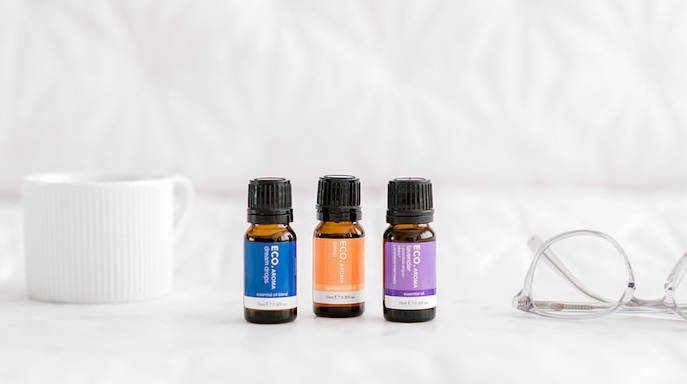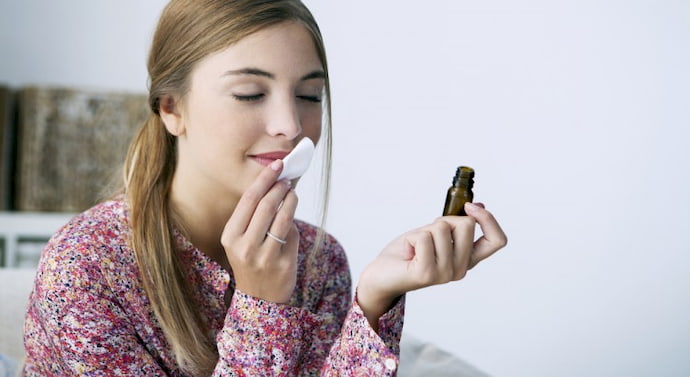Leading a stressful life can seriously affect your sleeping cycle. And the lack of sleep, on the other hand, can only contribute to even more stressful days. If you wonder how you can break this vicious circle, there might be a simple solution for you – essential oils.
Essential oils are extracted from plants’ active botanical constituents and in a way, they’re a liquified version of the plant. These extracts are more effective in providing the benefits of the plant than consuming it. So, when you use essential oils, you get the best of the plant because its active botanical elements, such as alkaloids, flavonoids, minerals, and phenols are directly brought to you in a concentrated manner.
That being said, the phenols and similar active ingredients that have a relaxing property can be used to improve sleeping habits. On the market, you can find various essential oil blends for sleep, specially made to help you relax your mind and body. Let’s see what are some of the best oils for insomnia in addition to the ways you can use them.

Source: wellandgood.com
Lavender Oil
You already know that lavender has supreme relaxing effects. That’s why it’s used in candles, bath bombs and similar wellness products. However, lavender oil offers and even more potent relaxation effect. Researchers discovered that the use of lavender oil can enhance slow-wave sleep, which is effective for slowing heart rate and muscle relaxation. When your muscles are relaxed and your heart rate is slower, you will be able to fall asleep fast and deeper. Plus, it truly smells amazing.
Chamomile Oil
Chamomile helps to relieve insomnia indirectly by reducing anxiety and depression. Anxiety and depression are some of the most common causes of insomnia. Of course, chamomile oil is not a cure for both states and you should always consult with a professional if you feel anxious or depressed. However, it is helpful in reducing mild levels of stress and anxiety, which often lead to depression.
Sweet Marjoram Oil
The smell of sweet marjoram is widely known for its calming properties. As a result, this is another essential oil recommended for treating insomnia. Relax and calm your brain with marjoram after a long day, so your body can prepare for a calm and a good night’s sleep.
Bergamot Oil
Bergamot is a citrus fruit but it’s often used in essential oil blends for sleep because it doesn’t have stimulating properties like other citrus oils. Studies have discovered that bergamot essential oil causes physiological changes, such as decreasing heart rate and blood pressure that lead to falling asleep easier. Don’t forget that bergamot oil is known to be photosensitive, so it’s not recommended to apply it topically before going outside (if you do this before bed, don’t forget to apply an SPF cream when going out the next morning).

Source: ecomodernessentials.com.au
Valerian Oil
Valerenic acid in valerian oil is known to repress the breakdown of the neurotransmitter GABA, which influences sleep. Valerian oil is well-known as a potent natural anti-anxiety medicine and recommended for people who don’t want to use strong medication.
Sandalwood Oil
Sandalwood has a woody and earthy scent which creates a warm and cosy atmosphere that many find calming and sleep-inducing. According to researchers, sandalwood may also have a sedative effect by decreasing wakefulness.
Ylang Ylang oil
Ylang Ylang oil is derived from the ylang-ylang fruit of Canaga trees, that grow in Indonesia. This oil is famous for its soothing effects, relieving stress and promoting sleep. One of its many benefits is lowering blood pressure which is also another way to get your body ready for sleep.
Jasmine Oil
Jasmine’s botanical constituents have a molecular mechanism similar to some medicines prescribed for sleep. As a result, jasmine oil is commonly used as a treatment in preventing insomnia. It smells amazing, so you’d love to use it every night.
Peppermint Oil
Peppermint oil is known as a great way to unblock a congested nose. Its fresh scent may not feel as if it’s going to help you fall asleep, but the anti-inflammatory nature of this oil is ideal for people who snore and have sleep apnea symptoms. It helps to clear your airways so that you can breathe better and sleep more firmly.
Essential Oils Methods of Use: Topical Application vs Inhalation
Essential oils for sleep are most commonly used in one of two ways: either topically or through inhalation.

Source: mariefranceasia.com
When using them topically, you can rub several drops on key parts of your body like wrist, neck, chest, forehead, feet or hands. By massaging the oils into your skin, not only will the active ingredients get into your body, but your muscles relax too. If you don’t use a blend, it’s best to mix the essential oil with a carrier oil such as olive, coconut, sweet almond or grapeseed oil. This is because your skin may be sensitive to undiluted oils.
When it comes to the method of inhalation, a simple way is to light aromatherapy candles, which come with wax infused with essential oils. You can also get a special essential oil diffuser which will release the scent into the air for you to inhale and enjoy. Just pour a few drops in the air diffuser and relax in the calming atmosphere it creates.
Another great method is to add essential oils in a pot of boiling water and inhale the steam. Put a towel over your head so the steam won’t go away. Be careful with this to avoid potential burns. Inhalation is an amazing way to relax congested nose and fill your lungs with hot steam; your body will relax and you’ll be able to fall asleep quickly.
Essential oils for insomnia may also be added to water and placed into a spray bottle. This way, you can spray the content on your pillow, bed sheets and in your room before going to bed.
You can also simply put several drops of essential oils on your hands, rub your palms and smell them. This way, you’ll use them both topically and through inhalation.


















